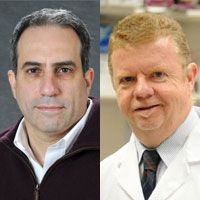
WASHINGTON (May 29, 2012) —GW Researchers, Jeffrey M. Bethony, Ph.D., associate professor of Microbiology, Immunology, and Tropical Medicine, and Paul Brindley, Ph.D., professor of Microbiology, Immunology, and Tropical Medicine at GW School of Medicine and Health Sciences, along with colleagues from Khon Kaen University in Thailand have determined that plasma Interleukin-6 (IL-6) levels are an sensitive and specific biomarker for the detection of the advanced bile duct fibrosis and bile duct cancer that comes from chronic infection with the Asian Liver Fluke (Opisthorchis viverrini). The research, titled, “Elevated Plasma IL-6 Associates with Increased Risk of Advanced Fibrosis and Cholangiocarcinoma in Individuals Infected by Opisthorchis viverrini,” was recently published in the journal, PLoS Neglected Tropical Diseases.
This discovery is a critical advance for the Northeastern (Isaan) region of Thailand and other areas of Southeast Asia, where an estimated 10 million people are currently infected with Asian Liver Fluke, which is the leading cause of cancer in the region. This food-borne parasite encysts in the fins, skin, and musculature of fish and infection occurs when people ingest this raw or uncooked fish. While the infection can be cured by chemotherapy, environmental and cultural factors of the region strongly favors rapid reinfection, with bile duct cancer as a common outcome. Northeastern Thailand has the highest levels bile duct cancer in the world. The determination that plasma IL-6 levels are associated with bile duct fibrosis (a precursor state to bile duct cancer) and early bile duct cancer were done by examining participants in the Khon Kaen Cholangiocarcinoma Cohort, the largest cancer cohort of its type in the world, and an NIH sponsored project in collaboration with George Washington University and Khon Kaen University. In this study, researchers visited nearly 4,000 individuals resident in rural areas of Thailand, where the parasite is endemic to conduct ultrasound studies to detect advanced bile duct fibrosis and early bile duct cancer and then link the ultrasound results with levels of plasma IL-6. This research was done in collaboration with Drs. Banchob Sripa, Bandit Thinkhamrop, Eimorn Mairiang, and Thewarach Laha from the Khon Kaen University School of Medicine and School of Public Health.
As a result of the identifying this biomarker, the Thai Ministry of Public Health has implemented testing for levels of plasma IL-6 for individuals between 20 and 60 in endemic regions of Isaan Thailand to identify individuals at risk for bile duct cancer. Through this test, it is hoped that bile duct cancer can be detected earlier and at a more treatable stage.
“Typically, bile duct cancer has a late presentation, and so a very high mortality rate. Now that we’ve identified the IL-6 biomarker, our hope is that earlier detection is possible and earlier treatment saves more lives,” said Jeffrey M. Bethony, Ph.D., associate professor of Microbiology, Immunology, and Tropical Medicine at the GW School of Medicine and Health Sciences (SMHS).
In collaboration with Dr. Jason Mulvenna of the Queensland Institute of Medical Research in Brisbane Australia, the researchers are also using quantitative proteomics approaches to identify biomarkers that could be used in an even more sensitive and specific test for the early detection of this infection-associated bile duct cancer. The current discovery was possible through funding from an RO1 grant (R01CA155297-01) from the National Cancer Institute (NCI) of the National Institutes of Health (NIH).


